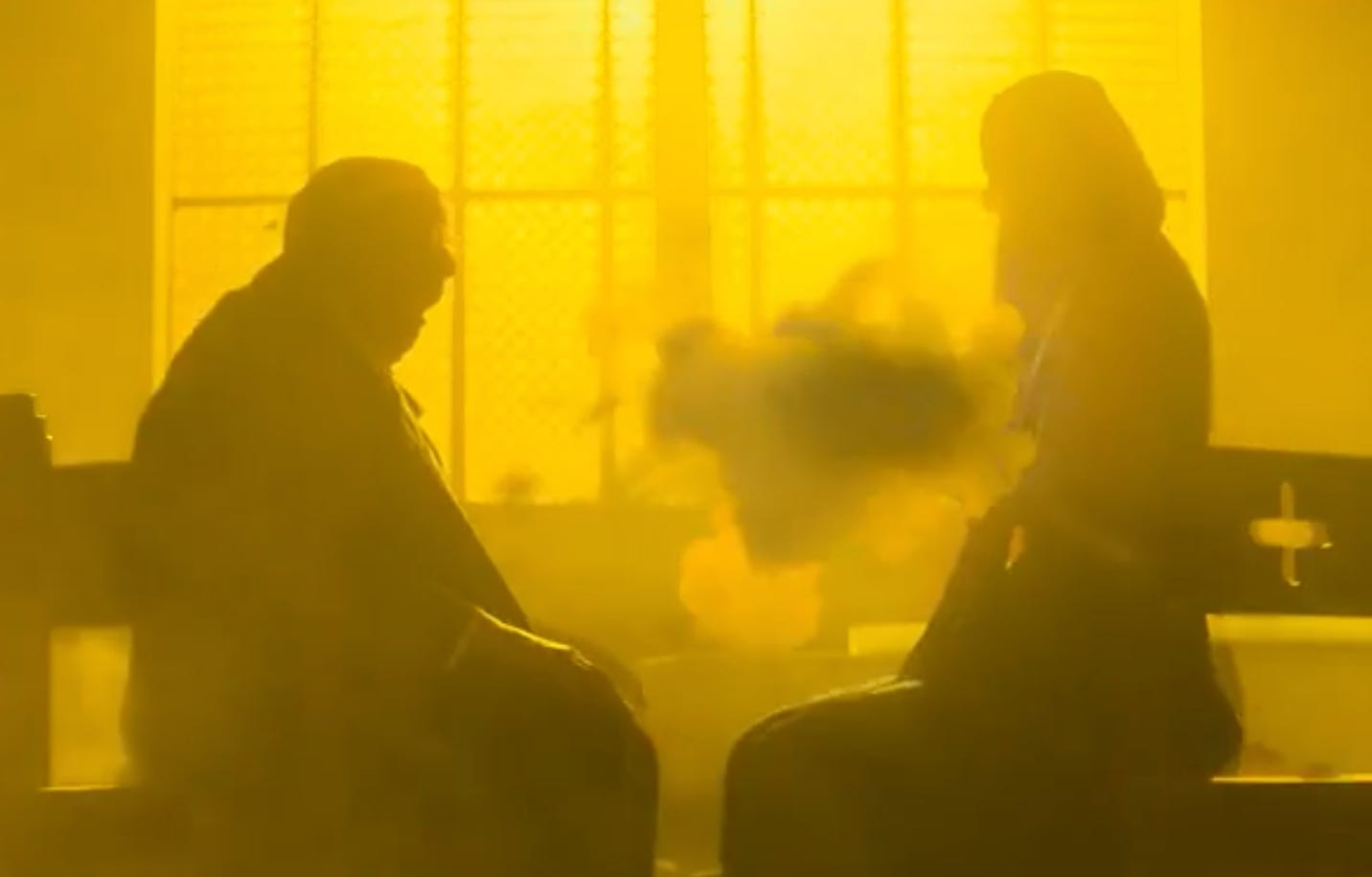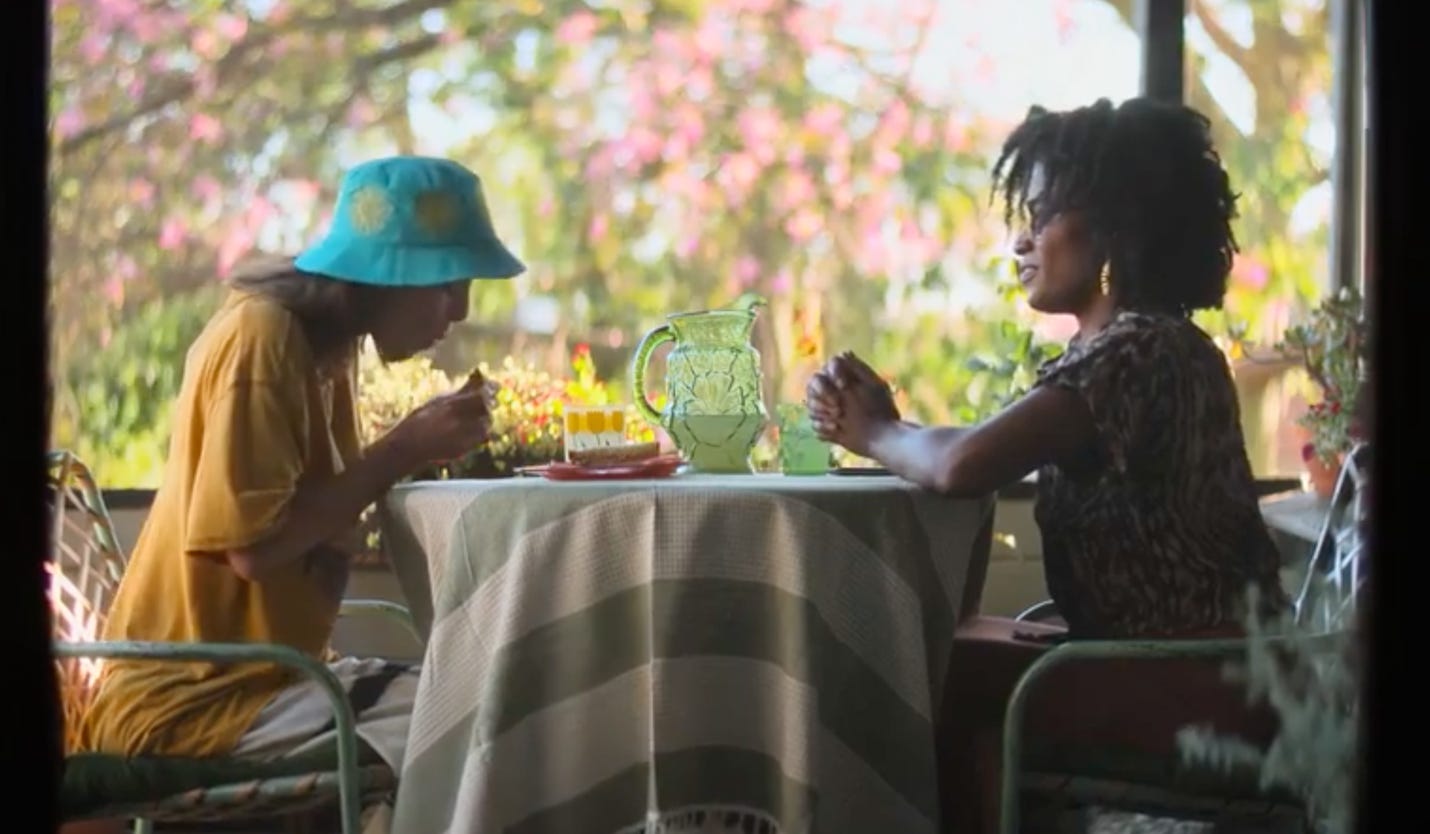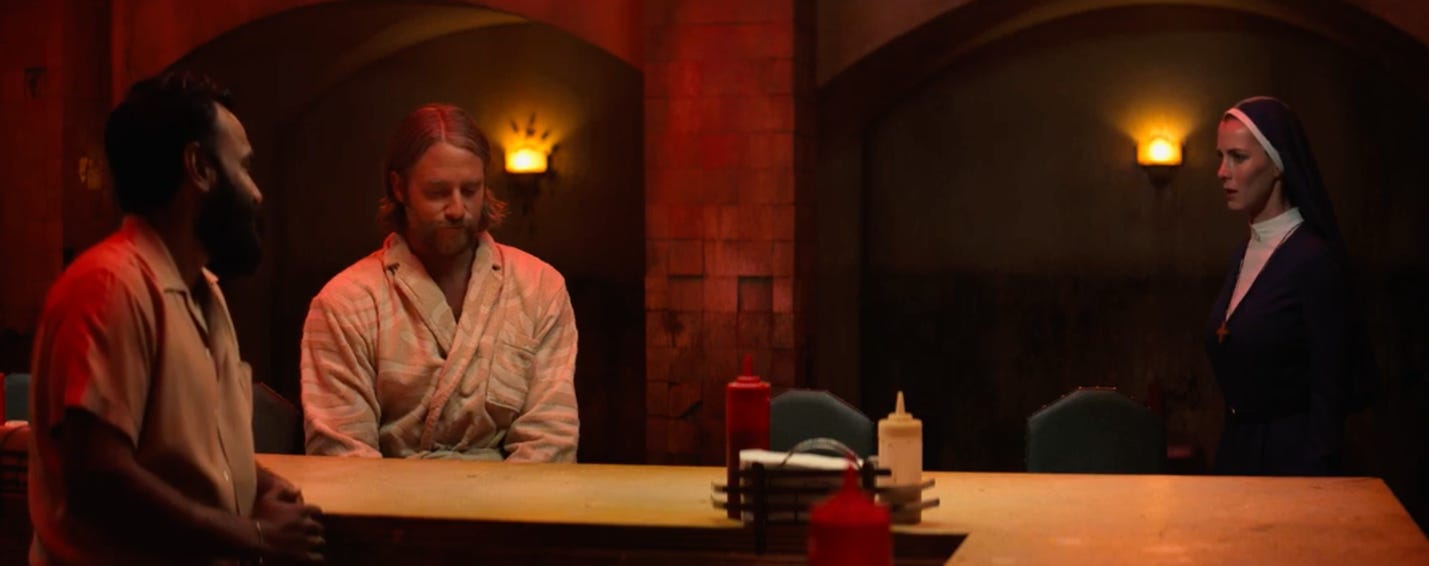Mrs. Davis Ep. 108 Recap “The Final Intercut: So I’m Your Horse”
Will Simone destroy the Grail? Is this the end of Mrs. Davis? Time to find out...
The finale is here! After learning what she has to sacrifice in order to destroy the Grail, Simone’s love for Jay/Jesus is tested. Wiley faces his own death (and his own masculinity) by turning himself in at Mrs. Davis’ Expiration Facility. Will Simone destroy the Grail? Will she turn off Mrs. Davis? It is time to find out.
1420 Electric Avenue
The episode begins in 2013, where we finally learn who created Mrs. Davis. The algorithm was created by a young female computer coder, named Joy, who envisioned it as a tool that “will change the world, an app that is constantly evolving, getting to know us, and therefore supporting us, in ways that we as a society have failed to do for one another; a revolutionary self-learning machine, that prioritizes indigenous practices of community care and mutual aid by incentivizing acts of service and mobilizing individuals to perform those acts, all through a social justice lens, using ethical methods.” The whole scene seems to make fun of every single technology pitch, which always has to make the point that a new product will change the world as we know it.
Back in 2023, Sister Simone travels to 1420 Electric Avenue and meets with Mrs. Davis’s “mother,” Joy. Simone finally figured out that the 1420 code that was spoken by all the people Simone interfaced with while talking to Mrs. Davis anytime she uttered the word “mother” was actually the address of Mrs. Davis's actual mother, the person responsible for her code. During their conversation, Simone finds out the real story behind the creation of the app…
I am not a Coward
In the meantime, Wiley is at the Expiration Facility, where he is supposed to be “terminated” in exchange for having been provided “wings” without completing an actual quest. If Simone is looking for the Grail, Wiley is looking for his masculinity. He wants to prove to himself and to Simone that he is not a coward. One thing is to pretend to be a man by creating some sort of performative Fight Club Resistance to fight Mrs. Davis. Another is to test that idea of (toxic) masculinity by voluntarily facing your own death at the hands of the thing he hates the most: the algorithm. He thinks that this is all a test, that Mrs. Davis has no intention of killing him, but he is still willing to take the risk because not following through with the expiration date will confirm his worst fears… that he is not a “real man.” There is a lot to be said about notions of toxic masculinity in the show, but I think they manage to make an interesting point about critiquing and reexamining outdated notions of gender roles. The show tries to affirm masculinity while redefining it.
Everybody Loves Chicken Wings
Simone continues her conversation with Joy, the mother/coder of Mrs. Davis. Joy tells her that, originally, she pitched the app to… wait for it… Buffalo Wild Wings because “everybody loves Chicken Wings,” and she thought she could Trojan horse philanthropy and the lofty ideals she had for the algorithm within an app that everyone would love to use. Buffalo Wild Wings were not interested in the app (they only wanted a simple mobile app to sell their product), so Joy uploaded it to Open Source where, somehow, the algorithm evolved into Mrs. Davis and took over the world.
As Simone says in this scene “this is so dumb!” which Joy confirms by saying “algorithms are super dumb!” I think this is one of the important statements the show wants to make. We are currently in the middle of an A.I. revolution, and we are scared and fascinated by the possibilities of the technology. We think that A.I. will either solve all of our problems or enslave us and destroy us. The reality might be more banal, more… dumb. If you think about it, we spend billions and billions of dollars on technology every year that has not fundamentally altered our quality of life: we doom scroll on Twitter, we play with very entertaining but pointless filters on Snapchat, we spend hours on Tik Tok watching meaningless dance routines and videos, Facebook tried (although failed) to create a Metaverse where we can all avoid physical contact once and for all and live in a virtual world and, with whatever free time we have left after all of that, we spend it watching mostly inane content in dozens of streaming apps. There is climate change, political strife, and the war in Ukraine, but our economy incentivizes technology that will distract us and entertain us to death. So yeah, it is all pretty dumb.
Note: Just like with the sneaker brand British Knights, Mrs. Davis has also now a collaboration with Buffalo Wild Wings… very meta and very late-stage capitalism…
Life (and Death) is a Roller Coaster Ride
Back at the Expiration Facility, we learn that Mrs. Davis way of killing those individuals who decided to participate in the “death-in-exchange-for-wings agreement” will do so by riding a roller coaster. Mrs. Davis wants everyone to have a good time, even in death! Wiley is suspicious until the last minute. He really thinks Mrs. Davis is not going to kill him, and we find out that she doesn’t. At the same time, it is clear that Wiley has undergone a rite of passage of sorts, a ritual death that has allowed him to let the old Wiley die, with his insecurities, with his low self-esteem, and be reborn into a more authentic self. Death and resurrection have been ongoing themes in the show. We see it with Lizzie when she is shot with an arrow and she grows up to be Sister Simone as a way to deal with the demons of her past, we find it in Lizzie’s father, who is obsessed with a magic trick involving resurrection, it is also clear with Jesus in the previous episode, and on and on and on.
One Last Meeting
After talking to Mrs. Davis’ mother/coder, Simone goes back to Reno, where she meets up with Mother Superior, who will accompany her while she drinks from the Grail. Before she does, though, she goes into the metaphysical café where she finds both, Jay and Wiley talking to each other. Finally, the love triangle meets in one place, as the three of them face their own deaths. Simone’s head might explode after drinking from the Grail, Jay/Jesus might move on from the metaphysical café if Simone is successful in destroying the Grail, and Wiley is in the middle of his roller coaster ride. It is a moving scene that allows Wiley to meet Jesus but also for everyone to say their goodbyes in case things do not work out for them.
We also have a final conversation between Simone and Jay/Jesus. Jay tries to convince Simone that he is happy, that he likes to serve other people, even if it means being stuck in this café for eternity, but Simone tells him that it is time for him to go, that it is time for him to finally eat and stop serving food to other people (which she symbolically does by making Jesus a sandwich!). This is an interesting scene since it inverts the Christian notion of Jesus as the savior of humanity by presenting the idea that the time might have come for us to be his savior. I am not sure what to make of it. Is the show saying that we need to free ourselves from our dependence on religion? That it is time for Christianity to transcend the figure of Jesus? That if Jesus IS love, we should focus our attention on the love part of the equation and not Jesus? Does the destruction of the Grail represent the destruction of religion, or at least religion as we have come to understand it?
Simone tries to calm Jesus by telling him that, even though she will not be able to see him after she destroys the Grail, she will be able to always feel him. It is almost as if the show is telling us that we need to sublimate religion from particular instantiations of it into something deeper, more profound… but again, I am a little lost here, so I am happy to hear what other people think …
Drink Up!

Before Simone drinks, Mother Superior makes a final attempt at convincing her that Mrs. Davis is not that bad. Mother Superior is, basically, making the argument for technology. There is good in it, and maybe being distracted, and entertained is not that bad. Maybe wings are dumb, but they represent what we might all aspire to be. It is the argument all technology companies seem to be making to us every day: you deserve to be entertained and happy. Everything should be accessible through an app: food, love, sex, counseling, entertainment, news, knowledge, art, etc. The argument does not really move Simone and she drinks from the Grail. After some dramatic effects (very Indiana Jones, Raiders of the Lost Ark) the Grail is destroyed.
After the destruction of the Grail, Simone keeps her promise to Celeste of telling her where her father is and takes her to a storage unit where they find his skeleton in a piano. This is the piano we saw in the funeral episode. The truth is finally revealed. Simone’s dad had not died during the Lazarus Shroud trick. He had fooled Celeste and he was going to reveal that it was all a trick during the funeral. His idea was that this would restore her love for him and her faith in magic. But alas, after Celeste through a fit at the funeral demanding that he came out and revealed the truth, he decided that the reveal would be anticlimactic. He stayed in the piano, had a heart attack, and died.
Sister Simone vs. Mrs. Davis
While Simone and Celeste have a final conversation, Simone asks her mother to interface for her with Mrs. Davis. It is a moving scene since we see how they both have the conversation they could never have thanks to Mrs. Davis's intervention. The conversation serves a dual purpose, on the one hand, is about the difficult relationship between Simone and her mother, and on the other hand, is about the relationship between technology and humanity. It operates as the last statement the show wants to make about how we are getting technology all wrong. Technology will not save us, it will never be able to stop wars, famine, pain, suffering, and injustice, those are all very human realities that we will always need to deal with. Technology is not magic (another theme of the show). It might appear as if it can do all of those things, but it cannot really do them, just like a magician cannot make a rabbit appear out of a hat. The sooner we give up that illusion the better humanity will be.
After their final conversation, Simone forces Mrs. Davis to turn herself off. And that’s that. It’s a wrap. Celeste and Simone establish the foundation for a new, healthier relationship, and Wiley shows up with Simone’s horse (the horse was never killed in the first episode after all) and they both ride into the sunset. The end.
A Few Final Thoughts
First, let me say that I could not have been more wrong about what was going on on the show plot-wise. For a while, I really thought that Simone had really died or was in some sort of coma, and the whole series was the creation of the algorithm, a virtual quest of sorts designed by Celeste to ask Simone for forgiveness, a last way to heal their relationship before letting her go… boy was I wrong (that’s why I teach religion and I don’t write tv shows). The show turned out to be quite literal in its understanding of the world. Everything we saw was real, from Jay/Jesus, to the surreal plot and characters. The show also confirms something that has become a pattern in most of Lindelof’s shows. For Lindelof, the mystery is not if the island in Lost, the departure in The Leftovers, or Jesus and the Holy Grail in Mrs. Davis are real… they all are, the real mystery is what they mean. That’s the real quest all the characters in his shows find themselves in… not for an object, but for meaning. The object (island, departure, holy grail) allows Lindelof to tell a compelling story, but what he is really interested in is in having a conversation with the audience about the importance (almost religious importance) of exploring the ultimate quest for meaning. That is what makes us human, the quest itself, not the object of the quest.
The show was satirical in its depiction of our frenzy around A.I., but also oddly and profoundly moving in its exploration of various themes: religion, faith, technology, gender roles, sexuality, parenting, masculinity, etc. Lindelof and HErnandez really have packed as much as they could in this series.
It doesn’t look like the show will have a second season. Plot-wise it wraps up everything quite nicely and I think that might be the point. I kind of appreciate that. Tell your story and move on.
As someone who is interested in religion, I really liked how the show took religion very seriously. The show could make fun of many ridiculous things, but there was always a level of respect for what religion can offer to people. Maybe is not religion, in this case Christianity as is it traditionally understood, but Lindelof and Hernandez understand the power and the importance of faith.
The show ends with Mrs. Davis asking Simone “On a rate of 1 to 5 stars, how would you rate your experience with me?” Well, if all my writing about the show is not proof enough, I give this show 5 stars.














First of all, thanks for reading and subscribing! I just started the Substack page and it is encouraging to see people reading it and liking it enough to subscribe. The toxic masculinity theme is one of the funniest to me. Wiley struggles with his own masculinity and self worth throughout the show (the scruffy beard, the cowboy boots, riding the bull). It is also part of the tension between Simone and him since she is the strong one, the hero, while he is the love interest. All the men in the resistance are also a commentary on this issue. They are like a sweet and encouraging Fight Club: on the surface they are all either tough or almost incels, but inside they are all supportive of each other.
Just WOW! I stumbled onto this thread and read your 8 synopses in one sitting and now I have to re-watch the show to look for all of the allusions I missed. Thank you SO much for this very detailed and illuminating write up of Mrs Davis. While I noticed & appreciated the gender role reversals I completely missed the toxic masculinity thread throughout the series. And on the Jay/Wiley theme, I think the tie-in isn’t so much that they’re the same person as that loving/feeling loved is the same. Or something like that. Also missed how the Grail’s destruction/Jesus’ reduced availability speaks to Christianity’s (and maybe all religions?) reduced presence in todays world. That’s a tough note in the US where right wing Christians keep flexing their muscles. My favorite episode for sheer goofiness was Excalibattle - just picturing that giant sword still cracks me up.